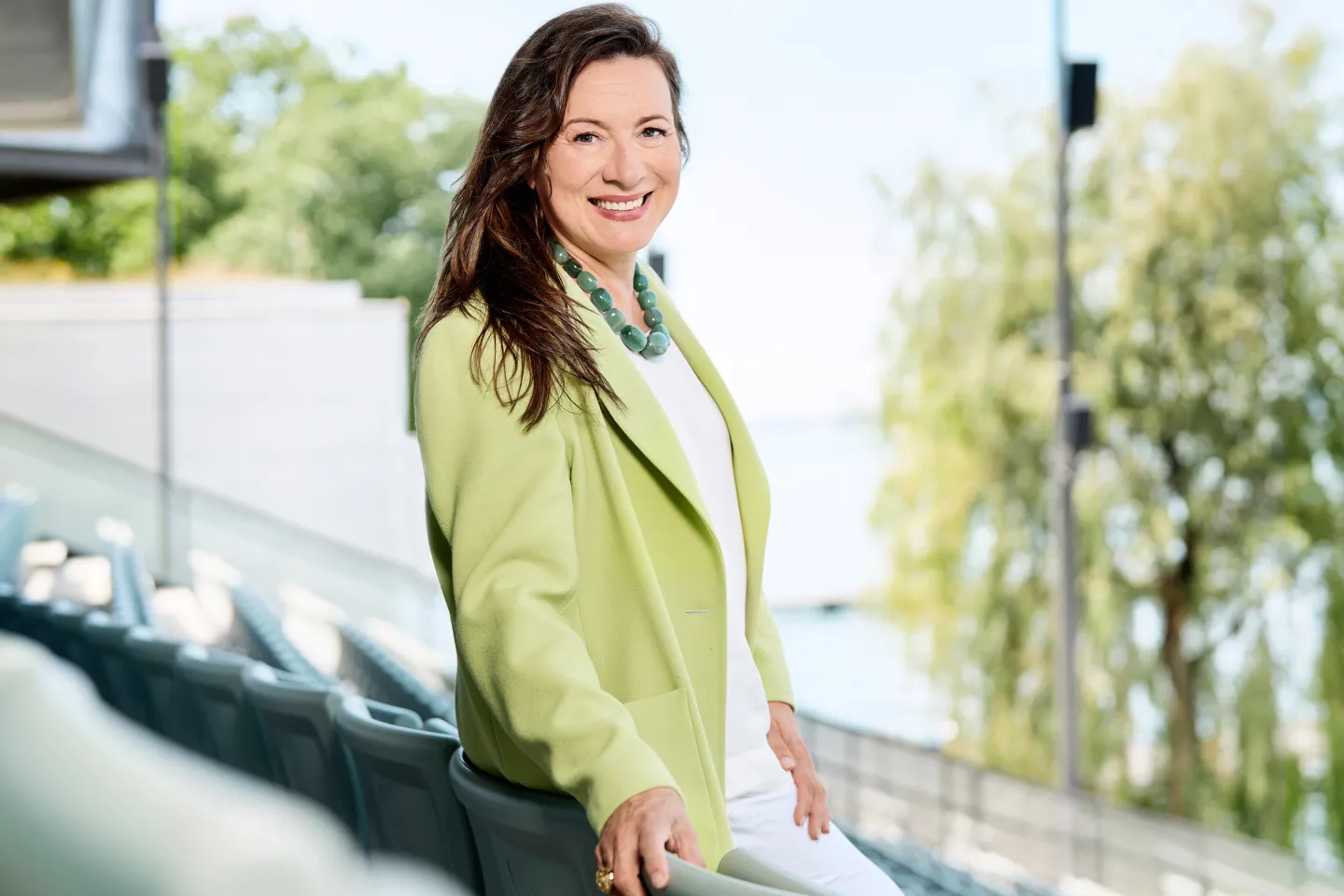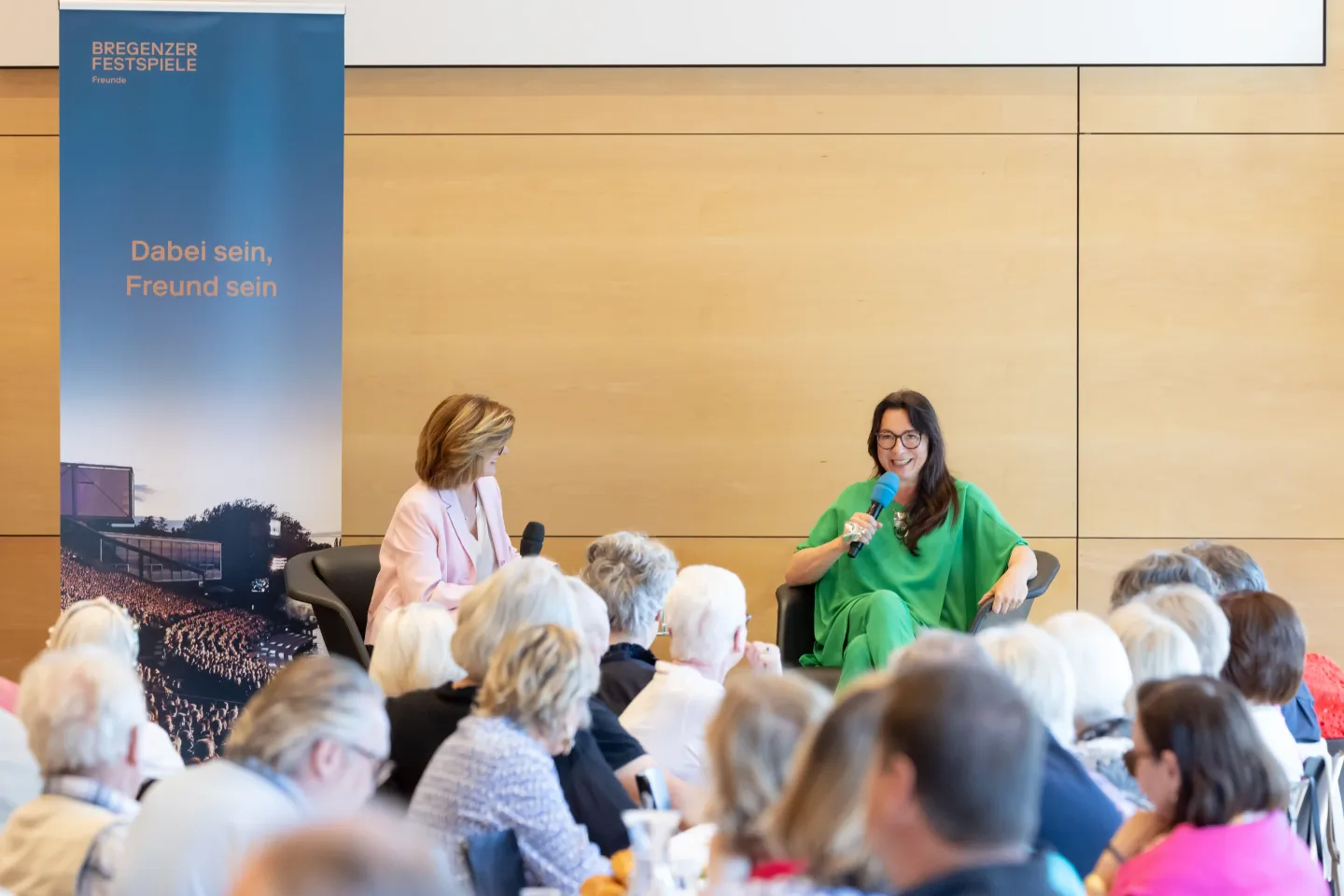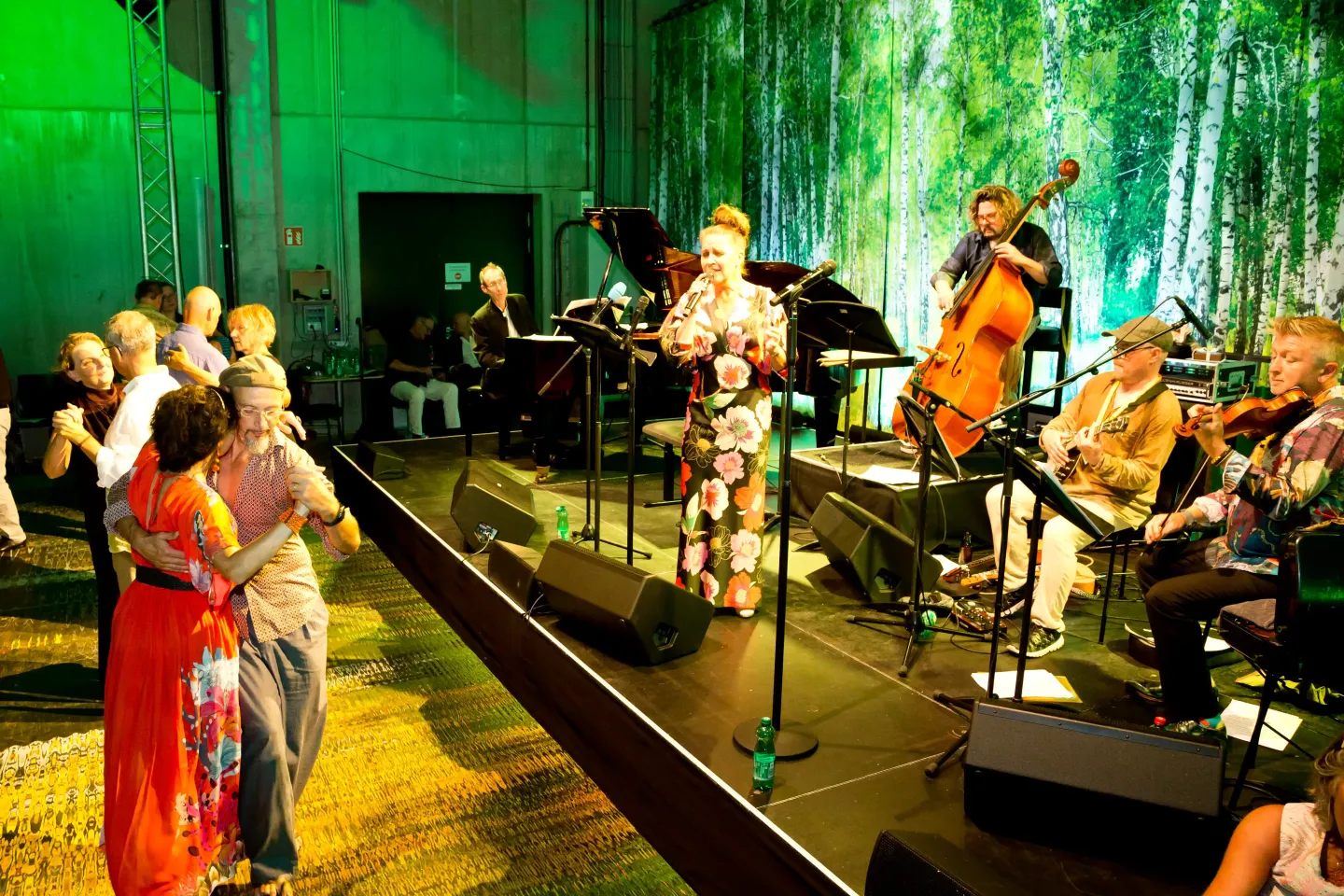Interview by Babette Karner.
The text was published in Edition 1 (11/25).
Reading time 5 Min.
Comfort for the Soul, Glamour—and a Fantastic Journey to the Moon
The tragic love of Violetta Valéry, the phantastic misadventures of Matěj Brouček—and in between, a major anniversary and plenty of Bach: Artistic Director Lilli Paasikivi about the 2026 festival summer.

© Bregenzer Festspiele / Anja Köhler
You have chosen La traviata as your first Opera at the Lake. What fascinates you about this opera—and why does it fit the Seebühne so well?
Lilli Paasikivi: The Opera at the Lake draws nearly 200,000 visitors every year, many of whom are experiencing opera for the very first time. This uniqueness calls for works that capture the audience in their entirety: Music, stage, atmosphere, and the lake as the setting create a truly special experience. La traviata is one of the most performed operas in the world, touching audiences through its emotional immediacy. The music strikes right at the heart. Violetta is a woman caught between fragility and glamour—a powerful symbol of our time.
What makes La traviata so popular?
The work has everything that makes an opera unforgettable: Grand arias, moving choral scenes, and a story that is universally comprehensible. It is about love, freedom, and transience. Violetta seeks liberation from societal constraints; she longs for genuine love and a fulfilled life. There are jubilant moments, like the famous Brindisi “Libiamo ne’ lieti calici” at the very start, conveying lightness and joy of life. Yet, as with Tosca or Madama Butterfly, it is often the quiet, tragic moments under the open sky that exert tremendous power.
I greatly admire director Damiano Michieletto as an innovative yet highly accessible storyteller. Together with experienced set designer Paolo Fantin, he sets our La traviata in the Roaring Twenties—an era perfectly reflecting the opera’s contrasts: Lavish parties, fragile intimacy, and a tragedy that touches the heart.
With The Excursions of Mr. Brouček as the Opera at the Festspielhaus, the Bregenzer Festspiele present a work that may initially appears eccentric but reveals surprisingly contemporary themes.
The title character embodies the petite-bourgeois who wishes to retreat into his nostalgic comfort zone, until in a dream, he is catapulted to the moon and the Middle Ages. This longing for retreat and security mirrors our present: We live in a world that, for decades, has been shaped by openness and globalization. People traveled, sought new experiences, and wished to explore other cultures. Today, however, we increasingly encounter the opposite: isolation, protectionism, and exclusion. Populists promise a return to supposedly “better times.” Brouček perfectly represents this mindset: He wants to ignore the new and foreign, only surrounding himself with the familiar.
Janáček wraps all this in music full of color, irony, and unexpected twists. Director Yuval Sharon masterfully captures this interplay of fantasy, satire, and contemporary relevance—with a keen sensitivity for grotesque exaggeration and subtle human nuance.
Does Brouček learn anything from his new experiences?
No—and that is precisely what makes the work so compelling: It is not a classical story of personal growth, but a satire. Brouček unwillingly travels through bizarre worlds and remains stubborn until the end. The opera holds up a mirror, asking how truly open we are to the world around us.
Together, we want to show what culture can achieve: Bringing people together, offering hope, and sharing joy.
Johann Sebastian Bach will play a significant role in summer 2026. A new work has been commissioned for the Werkstattbühne: Passion of the Common Man.
Bach is a cornerstone of the classical music tradition. His Passions are considered the epitome of sacred music. I was fascinated by the idea of bringing this genre into the present—not in a religious or Christian context, but as a passion about the sufferings of modern humanity. Many people today enjoy unprecedented material comfort: long life expectancy, medical advances, prosperity. Yet numerous individuals feel insecure, anxious, or overwhelmed. The abundance of choices and the constant flood of information lead to a kind of collective exhaustion.
This new work reflects that reality: Passion of the Common Man, created in collaboration with internationally renowned composer Daníel Bjarnason and librettist Royce Vavrek, explores humanity’s need for empathy in a futuristic, dystopian world and asks whether humanity can survive without compassion.
With Anne Sofie von Otter you have engaged an extraordinary singer for this work.
Yes, and we are delighted! Anne Sofie von Otter is an artist who has always crossed boundaries. She moves effortlessly between opera, song, concert, even folk and pop. For this reason, she is ideal for a project that consciously breaks away from classical formats.
Bach will appear a second time on the Werkstattbühne in a project called Bach Nirvana …
With Bach Nirvana, I wish to elevate the traditional piano recital to a new dimension. Bach’s piano music is comforting for the soul: calming, clarifying, healing—almost meditative. I want to share this experience with our audience: Bach Nirvana will be an immersion in sound and light, guiding listeners into a state of inner peace.
Together with pianist Angela Hewitt, I have curated a program ranging from subtle, contemplative works to monumental preludes and fugues—a piano event of the highest caliber. This music will engage in dialogue with another art form: Mikki Kunttu, a brilliant lighting designer, will create a rich sensory experience on the Werkstattbühne.
Bach will also be heard in the Bregenzer Pfarrkirche St. Gallus (St. Gallus Parish Church) in 2026.
The great success of last summer’s concert with the YL Male Voice Choir inspired me to present another choral concert this year. The Bavarian Radio Chorus, which also plays a key role in Passion of the Common Man, will perform. The baroque jewel that is the Pfarrkirche St. Gallus (St. Gallus Church) is the perfect setting for Bach: A place where work and sound unite ideally.

What are your plans for the Opera Studio?
We will present Gaetano Donizetti’s L’elisir d’amore, an opera full of spirit and emotion, ideal for young voices: Lively, humorous, with lyrical roles and plenty of ensemble work. Director Anna Kelo transports the work into a modern setting: bold, fast-paced, yet heartfelt. The Opera Studio productions are intended to be youthful, accessible, and full of joy—perfect for the audience of tomorrow.
Next summer, we celebrate the 80th anniversary of the Bregenzer Festspiele under the theme “Free Fall into Passion”.
Passion is, of course, the main topic of La traviata and Passion of the Common Man. But the theme of this anniversary also reflects the dedication of everyone who makes the festival possible. It is this devotion to the productions and the experience that brings the artists, the festival team and the audience together.
For me, this anniversary is far more than a stage celebration. From the very beginning, I have been inspired by the history of the Bregenzer Festspiele: Founded shortly after the Second World War as a symbol of renewal, driven by people who believed in the unifying power of music. I aim to revive that spirit and passion next summer as a shared celebration for the entire region.
Alongside an exhibition on the Bregenz lakeside promenade featuring images of legendary productions on the Seebühne, we are planning a major community project: The Singalong at the Lake. Choirs and associations from across the Lake Constance region will come together, turning the outdoor auditorium into one musical entity. Together, we will sing the most beautiful opera choruses from eight decades of Festspiel history—a living symbol of what culture can achieve: Bringing people together, offering hope, and sharing joy.

From dancing to singing together: Tango am See in 2025 and the Singalong at the Lake 2026 reflect Lilli Paasikivi’s joy in connecting and sharing musical experience.


